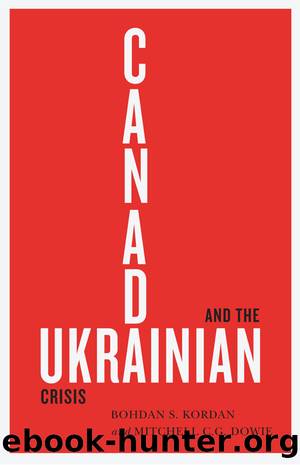Canada And The Ukrainian Crisis by Bohdan S. Kordan & Mitchell C.G. Dowie

Author:Bohdan S. Kordan & Mitchell C.G. Dowie
Language: eng
Format: epub
Publisher: McGill-Queen’s University Press
THE TENETS OF LEADERSHIP AND THE UKRAINIAN CRISIS
Stephen Harper was the most readily identifiable member of the new conservative elite that governed Canada from 2006 to 2015. Their rise coincided with multiple, overlapping crises that created a volatile and fragile political environment. During such periods, elites âseek alternatives to existing norms that have been discredited by events and in which new norms offer opportunities for political gains and coalitional realignment.â24 Thus, Canadaâs new conservatives not only acceded to Americaâs normative ideals, they embraced and internalized them as their own. Most importantly, however, they exhibited none of the anti-American suspicion that helped sustain the Laurentian consensus.25 This feature represents a key to understanding the shape and course of Canadian foreign policy under Stephen Harper and the contrast with what had preceded it. Following the Second World War, Canada supported the construction of a US-led global order, but latent anti-Americanism retarded the socialization process and prevented some Laurentian elites from fully internalizing the American vision. As a result, Canadaâs support for Americaâs agenda appeared perfunctory, with various governments even withholding support on occasion.
All of this would change when Stephen Harper assumed office. The contrast with the past could not have been starker. In a meeting between Harper and Margaret Thatcher â a staunch supporter of America â the former British prime minister impressed upon him the importance of aligning closely with the US, especially in view of its foundational role in maintaining the rules-based order. With US global leadership under pressure and given his pro-American disposition, it was advice Harper had no trouble taking to heart.26 No prime minister before or since had embraced the US and its vision of world order so openly, and no other prime minister had so clearly reshaped Canadian foreign policy to be more supportive of the US mission and its goals.27 This orientation was especially evident in the Harper governmentâs Ukraine policy.
Canadaâs willingness to follow was not tempered by Laurentian anti-Americanism. Rather, it was unequivocal and reflected Harperâs strong pro-American stance. Instead of attempting to serve as a counterbalance to the US, the Harper government actively looked to support the US by embracing its ideological goals and strategic role in defending the international order from challengers who sought to revise it.28 The full extent of the Harper governmentâs embrace of this commitment became clear following Russiaâs invasion of Ukraine in 2014, which Stephen Harper referred to as âa wake-up call.â29 The prime minister further anticipated that Russiaâs actions would not only lead to its isolation, but that these would also amplify âthe free worldâs unwavering fervour.â30 His remarks, far from being measured statements, mirrored political beliefs that had been formed by a particularly adversarial and uncompromising outlook.
Adam Chapnick would characterize this new brand of conservative foreign policy thinking, mainly associated with the prime minister, as âunCanadianâ insofar as it did not follow the traditional tenets that had governed Canadaâs past international engagement.31 From the point of view of the Harper Conservatives, however, Canadaâs new foreign policy would have been better described as âun-Laurentian.
Download
This site does not store any files on its server. We only index and link to content provided by other sites. Please contact the content providers to delete copyright contents if any and email us, we'll remove relevant links or contents immediately.
| Africa | Americas |
| Arctic & Antarctica | Asia |
| Australia & Oceania | Europe |
| Middle East | Russia |
| United States | World |
| Ancient Civilizations | Military |
| Historical Study & Educational Resources |
Magic and Divination in Early Islam by Emilie Savage-Smith;(1533)
Papillon by Henry Charrière(1426)
Bohemians, Bootleggers, Flappers, and Swells: The Best of Early Vanity Fair by Bohemians Bootleggers Flappers & Swells- The Best of Early Vanity Fair (epub)(1394)
Ambition and Desire: The Dangerous Life of Josephine Bonaparte by Kate Williams(1384)
Twelve Caesars by Mary Beard(1313)
Operation Vengeance: The Astonishing Aerial Ambush That Changed World War II by Dan Hampton(1155)
What Really Happened: The Death of Hitler by Robert J. Hutchinson(1154)
London in the Twentieth Century by Jerry White(1145)
The Japanese by Christopher Harding(1130)
Time of the Magicians by Wolfram Eilenberger(1125)
Twilight of the Gods by Ian W. Toll(1117)
Lenin: A Biography by Robert Service(1074)
The Devil You Know by Charles M. Blow(1024)
A Social History of the Media by Peter Burke & Peter Burke(968)
Freemasons for Dummies by Hodapp Christopher;(964)
Napolean Hill Collection by Napoleon Hill(939)
Henry III by David Carpenter;(919)
The Rise and Triumph of the Modern Self by Unknown(913)
Richard III (The English Monarchs Series) by Charles Ross(906)
